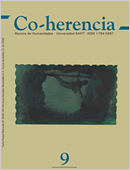The impossible peace. Saint Augustine as antecedent to Political Realism
Main Article Content
Keywords
Augustine of Hippo, International Relationships, Peace, War, Political realism, International politics
Abstract
The papers main purpose is to expose the struggle between peace and war concepts in St. Augustine political work. The purpose will be to revise the psychological basements of St. Augustine Political Thought. Second, to expose the political consequences of his thought and, finally, to deal with analogical character which the saint gives to the peace concept in order to be used in political stage as an ideal of political order. Both introduction and conclusion will deal with the question of Saint Augustine inscription as theoretical antecedent of political realism.
Downloads
Download data is not yet available.
References
Carr. E. (1964) The twenty Years’ Crisis, 1919-1939. New York,Harper & Row.
Cicerón, M. T. (1981) La República. Buenos Aires, Orbis.
Craig, C. (2003) Glimmer of a New Leviathan. Total War in the Realism of Niebuhr, Morgenthau and Waltz. New York, Columbia University Press.
Deane, H. (1963) The Political and Social Ideas of St. Augustine. New York andLondon, Columbia University Press.
Deane, H. (1973) “Classical and Christian Political Thought”. En: Political Theory I(4).
Echavarría, S. (2008) “Momentos del enemigo. Antecedentes de una distinción”.En: Carl Schmitt. Derecho, política y grandes espacios. Giraldo, J. y Molina, J. (Eds.) Medellín, Fondo Editorial Universidad Eafit - SEPREMU.
Forde, S. (1995) “International Realism and the Science of Politics: Thucydides, Machiavelli, and Neorealism”. En: International Studies Quarterly XXXIX(2).
Gilpin, R. (1986) “The Richness of the Tradition of Political Realism”. En: R.O.Keohane (Ed.) Neorealism an Its Critics. New York, Columbia University Press.
Lewis, E. (1964) “The Political and Social Ideas of St. Augustine. By Herbert A. Deane”. En: Political Science Quarterly LXXIX(3).
Loriaux, M. (1992) “The Realists and Saint Augustine: Skepticism, Psychology and Moral Action in International Relations Thought”. En: International StudiesQuarterly XXXVI(4).
Martin, R. (1972) “The Two Cities in Augustine’s Political Philosophy”. En: Journal of the History of Ideas XXXIII(2).
Morgenthau, H. (2001) Escritos sobre política internacional. Madrid, Tecnos.
Rosati, J. (2000) “The Power of Human Cognition in the Study of World Politics”.En: International Studies Review II(3).
Rossi, M. (2000) “Agustín: El pensador político”. En: La filosofía política clásica. De la Antigüedad al Renacimiento. Borón, Atilio (Comp.) Buenos Aires, Clacso - Eudeba.
Rossi, M. (2005) “Cicerón y Agustín: contrafiguras para pensar la política”.En: Co-herencia III(2).
San Agustín (1959) De Christiana Doctrina. Madrid, Biblioteca de Autores Cristianos.
San Agustín (1942) Ciudad de Dios. Buenos Aires, Poblet.
Schopenhauer, A. (1993) El Mundo como voluntad y representación. Madrid, SigloXXI.
Söndergaard, B. (2008) “The political realism of Augustine and Morgenthau: Issues of Man, God, and just war” En: Alternatives: Turkish Journal of international relations VII(1).
Stevenson, W. (1988) Christian Love and Just War: Moral Paradox and political lifein St. Augustine and his modern interpreters. Macon (GA), Mercer University Press.
Thomas, S. (2001) “Faith, History and Martin Wight: The Role of Religion in the Historical Sociology of the English School of International Relations”. En: International Affairs LXXVII(4).
Tinder, G. (1997) “Augustine and the Limits of Politics”. Reviewed work By Jean Bethke Elshtain. En: The American Political Science Review, XCI(2).
Waltz, K. (1979) Theory of International Politics. Boston, McGraw Hill
Cicerón, M. T. (1981) La República. Buenos Aires, Orbis.
Craig, C. (2003) Glimmer of a New Leviathan. Total War in the Realism of Niebuhr, Morgenthau and Waltz. New York, Columbia University Press.
Deane, H. (1963) The Political and Social Ideas of St. Augustine. New York andLondon, Columbia University Press.
Deane, H. (1973) “Classical and Christian Political Thought”. En: Political Theory I(4).
Echavarría, S. (2008) “Momentos del enemigo. Antecedentes de una distinción”.En: Carl Schmitt. Derecho, política y grandes espacios. Giraldo, J. y Molina, J. (Eds.) Medellín, Fondo Editorial Universidad Eafit - SEPREMU.
Forde, S. (1995) “International Realism and the Science of Politics: Thucydides, Machiavelli, and Neorealism”. En: International Studies Quarterly XXXIX(2).
Gilpin, R. (1986) “The Richness of the Tradition of Political Realism”. En: R.O.Keohane (Ed.) Neorealism an Its Critics. New York, Columbia University Press.
Lewis, E. (1964) “The Political and Social Ideas of St. Augustine. By Herbert A. Deane”. En: Political Science Quarterly LXXIX(3).
Loriaux, M. (1992) “The Realists and Saint Augustine: Skepticism, Psychology and Moral Action in International Relations Thought”. En: International StudiesQuarterly XXXVI(4).
Martin, R. (1972) “The Two Cities in Augustine’s Political Philosophy”. En: Journal of the History of Ideas XXXIII(2).
Morgenthau, H. (2001) Escritos sobre política internacional. Madrid, Tecnos.
Rosati, J. (2000) “The Power of Human Cognition in the Study of World Politics”.En: International Studies Review II(3).
Rossi, M. (2000) “Agustín: El pensador político”. En: La filosofía política clásica. De la Antigüedad al Renacimiento. Borón, Atilio (Comp.) Buenos Aires, Clacso - Eudeba.
Rossi, M. (2005) “Cicerón y Agustín: contrafiguras para pensar la política”.En: Co-herencia III(2).
San Agustín (1959) De Christiana Doctrina. Madrid, Biblioteca de Autores Cristianos.
San Agustín (1942) Ciudad de Dios. Buenos Aires, Poblet.
Schopenhauer, A. (1993) El Mundo como voluntad y representación. Madrid, SigloXXI.
Söndergaard, B. (2008) “The political realism of Augustine and Morgenthau: Issues of Man, God, and just war” En: Alternatives: Turkish Journal of international relations VII(1).
Stevenson, W. (1988) Christian Love and Just War: Moral Paradox and political lifein St. Augustine and his modern interpreters. Macon (GA), Mercer University Press.
Thomas, S. (2001) “Faith, History and Martin Wight: The Role of Religion in the Historical Sociology of the English School of International Relations”. En: International Affairs LXXVII(4).
Tinder, G. (1997) “Augustine and the Limits of Politics”. Reviewed work By Jean Bethke Elshtain. En: The American Political Science Review, XCI(2).
Waltz, K. (1979) Theory of International Politics. Boston, McGraw Hill
